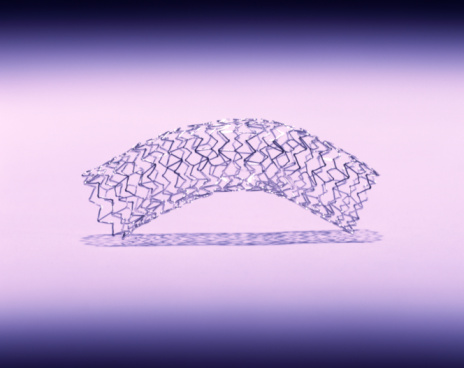Heart Stents Attorneys Serving New York and New Jersey
Millions of patients who have received drug-coated heart stents—such as the Cypher heart stent made by Cordis, a subsidiary of Johnson & Johnson, and the Taxus heart stent made by Boston Scientific—are at an increased risk of suffering serious stent-related side effects including blood clots, heart attack, stroke, and death.
In many cases, patients who have received these stents will require lifelong drug treatment with blood thinners to reduce the serious risks posed by these drug-coated heart stents. This drug treatment poses additional health risks including severe bleeding and stroke. The treatment also comes with a price tag of approximately $1,200 each year.
If you or a loved one has suffered a serious side effect caused by a stent, please contact The Oshman Firm of New York, to learn more about your legal rights and options from one of heart stents attorneys. You may have the legal right to seek compensation for your losses and suffering. If you require long-term drug therapy to reduce the risks posed by your heart stent, you may also be eligible to seek compensation for your medical expenses and more.
Brief Heart Stent History
To understand the danger of drug-coated heart stents, it is helpful to understand why they are used and how they came to dominate the market.
 In the early 1980s, doctors began performing a procedure called balloon angioplasty, which involved inserting a tiny balloon into the veins in order to reach and push open the clogged artery. While this procedure was effective, it posed the problem of restenosis. In fact, restenosis, or the re-clogging of a treated artery, occurred in half of all patients who underwent angioplasty.
In the early 1980s, doctors began performing a procedure called balloon angioplasty, which involved inserting a tiny balloon into the veins in order to reach and push open the clogged artery. While this procedure was effective, it posed the problem of restenosis. In fact, restenosis, or the re-clogging of a treated artery, occurred in half of all patients who underwent angioplasty.
To solve this problem, stent manufacturers developed the first metal stent in 1994. These stents were permanently inserted into the artery to prop it open and keep it unclogged. While these bare metal stents reduced the risk of restenosis, 20 to 30 percent of all stent patients still experienced this condition.
Then in April 2003, Johnson & Johnson, through its subsidiary Cordis, introduced the first drug-coated heart stent, the Cypher heart stent. This drug-eluted stent slowly releases a drug intended to reduce the risk of restenosis. Although these new heart stents cost significantly more than the metal stents, ($2,000 versus $800, respectively) their use gained immense popularity immediately. Within the first eleven months, 350,000 patients received the Cypher heart stent.
Early Cypher Heart Stent Warnings
The Food and Drug Administration approved Cordis’s Cypher heart stent in April 2003. One would imagine that because the FDA approved the new stent, it had been deemed safe and effective for its purpose. However, this wasn’t necessarily the case. Evidence has revealed that the drug-coated heart stents have never been proven to prevent heart attacks or save patients’ lives.
Compared to pre-marketing studies required by drug makers, Cypher studies involved a smaller human sample, were conducted for a shorter period, and were more narrowly focused. Since the beginning, serious problems have been associated with drug-coated heart stents.
In July 2003, just three months after the Cypher heart stent was approved, the FDA issued a safety warning, stating that it had already received 34 reports of blood clots in Cypher patients. Five people died because of serious side effects caused by the Cypher heart stent in those first three months. In October 2003, the FDA issued a second Cypher warning, this time stating that 290 patients had developed life-threatening blood clots caused by the heart stent. The death toll was up to 60.
The FDA stated that 50 additional patients had died due to allergic reactions to the stent material or drug. Despite these serious risks, the Cypher heart stent remained on the market while similar products entered the market, posing serious risks to millions of patients.
The Taxus Heart Stent
In March 2004, the FDA approved the Taxus heart stent, manufactured by Boston Scientific. This heart stent, which poses the same risks as the Cypher heart stent, also has a history of safety problems. In July 2004, Boston Scientific initiated a Taxus heart stent recall of hundreds of stents because they posed the risk of malfunction and injury.
Despite their serious risks, the Cypher and Taxus heart stents have been inserted into the arteries of approximately four million people. These devices rake in over five billion dollars annually. Both Boston and Cordis/Johnson & Johnson continue to insist that their products do not pose significant risks, despite the facts.
According to Spencer King, the first cardiologist to perform heart stent implantation, up to 30 percent of patients who receive a drug-coated stent would do much better if they received a metal stent instead. For many, choosing the latter means a lower risk of heart attack.
Heart Stent Side Effects
Blood clots—drug-coated stents are covered in a polymer that releases steady amounts of the anti-restenosis drug over time. This prevents the development of scar tissue over the device. However, the polymer and metal remain exposed which can increase the risk of blood clot formation.
According to a 2006 Cleveland Clinic Study, patients who have received a drug-coated heart stent are four to five times more likely to develop a blood clot compared to patients who have received a bare metal heart stent.
Other studies indicate that 1 in 500 patients will develop life-threatening blood clots each year from drug-coated heart stents.
- Heart attacks—the formation of blood clots on the stent can significantly increase the risk of heart attack.
An estimated 4,500 drug coated stent patients suffer a heart attack each year due to side effects caused by the stent. Two thousand of these patients die.
Evidence also indicates that this risk of heart attack does not subside. This means that many patients who have received a drug-coated stent must use blood-thinning medications to prevent this device-induced risk. These medications are expensive and pose additional side effect risks.
- Death—more than 2,000 people die annually because of stent side effects. The most common causes of death include allergic reaction and heart attack.
- Allergic reaction—can occur in response to the drug or the stent material. Symptoms of an allergic reaction can include hives, fever, pain, trouble breathing, and blood pressure changes.
- Stroke
- Local Complications—tearing or rupture of the duct or vessel where the stent was inserted
- Restenosis—while the risk of artery re-clogging is comparatively less, five percent of all patients with drug-coated stents experience restenosis.
Lack of Adequate Stent Safety Regulation
 Before 1976, the medical device market was barely regulated by the government. With approval from Congress, the FDA began regulating medical devices in 1976. The agency is now responsible for ensuring that medical devices are safe, well-made, and effective.
Before 1976, the medical device market was barely regulated by the government. With approval from Congress, the FDA began regulating medical devices in 1976. The agency is now responsible for ensuring that medical devices are safe, well-made, and effective.
However, the 1976 law included a loophole that allows manufacturers to skimp on safety trials. The law states that a device can be approved with little or no clinical trials if it is deemed “substantially equivalent” to devices existing before the passage of the law. Many medical devices have been approved under this law.
In 1997, Congress passed another law that decreased the stringency of medical device safety regulations. This law mandated that medical devices be approved by the “least burdensome” method possible. These laws appear to serve the device industry at the expense of patients.
For example, when the Cypher stent was approved, it had only been tested on a little over 1,000 patients. Had the device been a heart drug, it would have required a study three times the size. If the device was required to go through more stringent pre-marketing testing, it is possible that many lives could have been spared.
In light of these serious safety problems, an advisory panel will convene in December 2006 to evaluate the safety of drug-coated heart stents. This panel will then advise the FDA as to whether any additional regulatory actions will be necessary.
What if I have received a drug-coated heart stent?
If you have received a drug-coated heart stent, it is best to speak with your doctor about what these side effect risks mean for you. If you experience any side effects, it is important to seek medical attention as soon as possible. Many patients who have received these stents will require lifelong drug treatment to mitigate the risks posed by their stent.
If you or a loved one is one of these patients, you may wish to contact us to learn more about seeking compensation for your medical expenses and other losses.
Other Dangerous Stents
 Ancure Aortic Stent by Guidant
Ancure Aortic Stent by Guidant
Other medical stents are also known to cause serious side effects. Guidant’s Ancure aortic stent, which was developed to treat aortic aneurism, has caused at least 12 deaths. Soon after the Ancure stent was approved in 2003, its maker Guidant learned that during installation the delivery system could malfunction, causing the stent to get stuck in a blood vessel. Between 2003 and 2005, over 7,600 patients received this stent. An alarming 2,600 of these stents malfunctioned, some causing serious or fatal injury.
While Guidant knew about these harmful side effects, the company kept them secret while innocent patients continued to receive this dangerous treatment. After several whistleblowers alerted the government about this horrifying cover-up, Guidant was charged and plead guilty to ten felonies and had to pay $92 million in fines. The company was no longer allowed to manufacture this dangerous stent.
Neck Stents by Abbott Laboratories
Questions have also been raised regarding the safety of neck stents manufactured by Abbott Laboratories. These stents are intended to prop open the carotid artery in the neck in order to reduce the risk of stroke. These stents have been hailed as a less invasive alternative to surgery, which involves cutting into the artery.
A 2006 study conducted by the French government indicates that Abbott’s neck stents cause stroke or death in ten percent of all patients. This is twice the risk associated with the traditional surgical procedure. To further determine the risk, Abbott is conducting a clinical trial involving 4,000 patients. Meanwhile, thousands of patients may be at serious risk of stroke or death posed by this stent device.
Seeking Compensation for Stent-Related Injuries
If you or a loved one has suffered serious injury or illness caused by a stent, you may be able to seek compensation for your medical expenses, loss of income, pain and suffering, and more. At The Oshman Firm, we would like to put our decades of legal experience to work for you and your family. We are highly qualified in handling cases of defective medical devices across the New York and New Jersey Regions. Our heart stent lawsuit attorneys are prepared to protect your interests and help you obtain the compensation you deserve. Please contact us today to speak with our experienced heart stents attorneys who can answer your legal questions and determine the best way to help.
